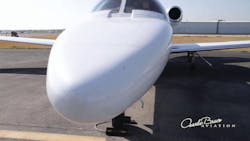Charlie Bravo Aviation Crunches The Numbers
“The private aviation industry is an often misunderstood and under-valued resource of the American economy,” explains René Banglesdorf, CEO of Charlie Bravo Aviation.
“Without it, many of the best companies in the country wouldn’t be half as productive as they are. The international implications of a robust private aviation industry have the potential to impact the US economy tremendously.”
It was all over the news back when the Big Three car manufacturers were lambasted for having used private jets to attend Congressional hearings, but the vast majority of Americans weren’t privy to the reasons for the CEO’s method of travel.
“It saddens me that the very people that jump on the bandwagon to attack private aviation are the ones who have the most to lose,” says Banglesdorf. “A CEO having to fly commercial and being much less effective directly impacts his or her employees. The CEO not closing a big deal means production cut, quotas missed, jobs lost. The world of private aviation is not the same as the luxury yacht market. The huge majority of times, private jets are used as essential business tools, not the sexy means of arrival for a junket. Disallowing use of this business tool hurts every American in a global economy when we need every competitive advantage we have.”
‘From a business standpoint, private aviation is a win-win’ explains Banglesdorf. ‘It enables you to travel in the most efficient way, without security queues, layovers or distractions on the aircraft. When you have several team members traveling together and you factor in their hourly wages and how much time is wasted in traveling on commercial airlines, it becomes cost-effective as well. You’d be surprised to learn how many small and mid-sized companies have used this competitive differentiator to expand their business footprint and grow—even in a receding economy.”
If you value the impact of meeting face-to-face, shaking hands, and inking deals in person, business aviation may be an important asset to consider. For instance, if a team from a Dallas-based company needs to visit a client’s facility in Fort Stockton, Texas, and then meet with the company’s executives in San Antonio, there are several options:
They can pile into someone’s SUV and drive:
Time: 7 Hr. drive to Ft. Stockton Have the meeting. Spend the night. 5 Hr. drive to San Antonio Have the meeting. 4 Hr. drive back to Dallas.
Lost productivity. 80 man hours in two days, just in driving.
Cost: 2 Vehicles – 1,000 Miles of driving – 6 Full tanks of gas - $360 36 meals – Average $20 per meal - $720 6 Hotel Rooms - $150 per night - $900 Lost Productivity – $8,000 (at a conservative $100 per man hour)
Total Cost of Trip: $9,980
They can fly commercially:
Time: 1 hr. at Airport 1 hr. flight to Midland/Odessa 2 hr. drive to Ft. Stockton Have the meeting. 2 hr. drive back to Midland/Odessa 1 hr. at Airport. 1 hr. flight to San Antonio. Spend the night. Have the meeting. 1 hr. at Airport 1 hr. Flight back to Dallas.
Lost Productivity. 60 man hours in two days (at a conservative $100 per man hour).
Cost: 18 Airline Tickets - $200 per ticket - $3,600 Two Rental Cars - $50 30 meals - $600 6 Hotel Rooms - $150 per night - $900 Lost productivity - $6,000 Total cost of trip: $11,150
They can fly privately:
Time: 1.5 hour flight to Ft. Stockton 10minute drive to facility
Have the meeting
10 minute drive back to airport 1 hour flight to San Antonio Have the meeting at the airport’s FBO 1 hour flight back to Dallas
Lost Productivity. 0. Executives can continue working, meeting, etc. on plane.
Cost: 3.5 hours in a chartered PC12 ($1000/hour)- $3,500 12 meals - $240.00
Total cost of trip: $3,740.00
“I believe that doing the math is a compelling enough exercise,” Banglesdorf says, “but then when you factor in the talent companies attract when they communicate that their sales, technical and management’s time and quality of life are that valuable, it’s a whole new ballgame.”
Rene’ Banglesdorf is the CEO of Charlie Bravo Aviation and Charlie Bravo Charter, both based in Texas. She owns and runs the only certified women business enterprises focused on the sale of aircraft in the world. Her company’s dedication to high ethical standards based on the model of the 1940‘s and 50‘s in America coupled with an unparalleled work ethic shows in the company’s branding with World War II flair, industry affiliations, and corporate sponsorship of Veteran Outdoors and the Sky Hope Network.
FOR MORE INFORMATION, PLEASE CONTACT
Bretton Holmes
President
Holmes World Media Inc.
512-981-7369
[email protected]
